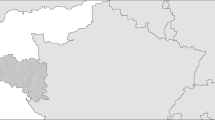Abstract
Integrating the decomposition of unknown morphologically complex words can enhance the recognition rates of morphological analyzers. Using linguisti cally motivated strategies for this decomposition leads to even more expressive re sults. The approach described here uses word formation rules and filtering tech niques to analyze and decompose words that are not contained in the underlying dictionary database. The average recognition rate of our German analyzers, applied to our test corpus, increased from 91% to 95,4%. Together with the current implementation, further future decomposition strategies will be presented.
Access this chapter
Tax calculation will be finalised at checkout
Purchases are for personal use only
Preview
Unable to display preview. Download preview PDF.
Similar content being viewed by others
References
Abel, A.: ELDIT (Elektronisches Lernerwörterbuch Deutsch-Italienisch) und elexiko: Ein Vergleich. In: Klosa, A. (ed.) Lexikografische Portale im Internet (= OPAL-Sonderheft 1/2008, hrsg. vom Institut für Deutsche Sprache Mannheim), pp. 175–189. Mannheim (2008)
Canoo.net: German dictionaries and grammar, http://www.canoo.net
DIX: Deutsch-Spanisch Wörterbuch, http://dix.osola.com/
Domenig, M., ten Hacken, P.: Word Manager: A System for Morphological Dictionaries. Georg Olms Verlag, Hildesheim (1992)
Eldit: http://www.eurac.edu/eldit
ten Hacken, P., Domenig, M.: Reusable Dictionaries for NLP: The Word Manager Approach. Lexicology 2, 232–255 (1996)
Leo, http://dict.leo.org
Lüdeling, A., Fitschen, A.: An Integrated Lexicon for the Analysis of Complex Words. In: Proceedings of EURALEX 2002, Copenhagen (2002)
OWID: elexico, http://www.owid.de/elexiko_/index.html
Pedrazzini, S.: Periphrastic Inflection Clustering for Term Extraction. In: Proceedings of the Seventh International Symposium on Communication and Applied Linguistics, Editorial Oriente, Santiago de Cuba (2001)
Pons: Das Online-Wörterbuch in fünf Sprachen, http://www.pons.eu
Author information
Authors and Affiliations
Editor information
Editors and Affiliations
Rights and permissions
Copyright information
© 2009 Springer-Verlag Berlin Heidelberg
About this paper
Cite this paper
Bopp, S., Pedrazzini, S. (2009). Morphological Analysis Using Linguistically Motivated Decomposition of Unknown Words. In: Mahlow, C., Piotrowski, M. (eds) State of the Art in Computational Morphology. SFCM 2009. Communications in Computer and Information Science, vol 41. Springer, Berlin, Heidelberg. https://doi.org/10.1007/978-3-642-04131-0_8
Download citation
DOI: https://doi.org/10.1007/978-3-642-04131-0_8
Publisher Name: Springer, Berlin, Heidelberg
Print ISBN: 978-3-642-04130-3
Online ISBN: 978-3-642-04131-0
eBook Packages: Computer ScienceComputer Science (R0)




